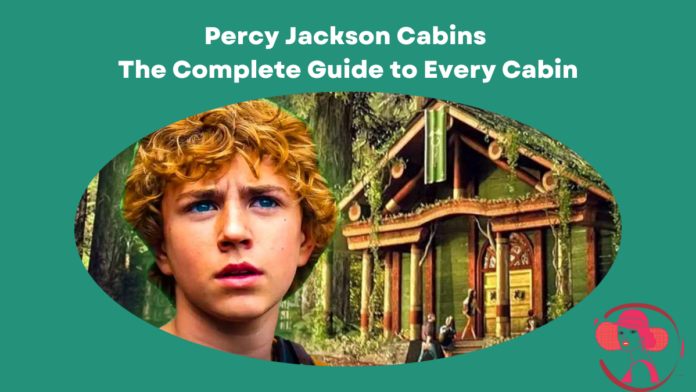The world of Percy Jackson is filled with mythological wonders and fantastical settings. Among these, the cabins at Camp Half-Blood stand out as unique sanctuaries for the demigod children of the Greek gods.
Each Perry Jackson cabin is dedicated to a specific deity and reflects that deity’s personality and powers. Let’s explore each of these cabins in detail, finding the secrets and characteristics that make them special.
What is the importance of the Percy Jackson cabins?
Each cabin at Camp Half-Blood serves as a home for demigod children. The cabins are not just places to sleep; they are symbols of the campers’ divine parentage.
Each cabin is designed to reflect the god or goddess it represents, filled with symbols, decorations, and magical elements that pay homage to their divine patrons.
Cabin 1: It is dedicated to Zeus, the king of the gods. This imposing and grand cabin symbolizes Zeus’s power and authority. The building is made of white marble and features imposing columns.
Inside, the cabin is spacious and filled with lightning bolt motifs and images of eagles. Zeus’s children are known for their leadership qualities and often possess abilities related to lightning and weather control.
Cabin 2: Although Hera, the goddess of marriage, does not have demigod children, her cabin is a tribute to her. It is beautifully decorated with images of peacocks and other symbols associated with Hera.
The cabin is more of a ceremonial space for meetings and gatherings rather than housing campers.
Cabin 3: It belongs to Poseidon, the god of the sea. It is one of the most famous cabins, mainly because of Percy Jackson, Poseidon’s son. The cabin is adorned with sea-themed decorations, such as shells, coral, and seaweed.
It always smells like the ocean and has a fountain that never runs dry. Children of Poseidon often have abilities related to water and can communicate with sea creatures.
Cabin 4 : Demeter’s cabin is dedicated to the goddess of agriculture. It is surrounded by gardens and plants that are always in bloom. The interior is cosy and filled with earthy tones and farming tools.
Demeter’s children are known for their ability to control plants and have a deep connection to nature.
Cabin 5: It is dedicated to Ares, the god of war. It has a rough, militaristic appearance and prominently displays weapons and armour.
The cabin is often filled with the sounds of combat training. Ares’s children are skilled fighters and often have a natural talent for strategy and combat.
Cabin 6: It is dedicated to the goddess of wisdom and battle strategy. It has an elegant design, with many bookshelves and a study area.
The cabin is filled with maps, blueprints, and various academic tools. Children of Athena are known for their intelligence and strategic thinking and often have a love for learning.
Cabin 7: It belongs to Apollo, the god of music, poetry, and healing. The cabin is always filled with music and has instruments scattered around. Its walls are adorned with beautiful poetry and artwork.
Apollo’s children are often talented musicians and healers, possessing the ability to use music and poetry for magical effects.
Cabin 8 : Artemis does not have demigod children as she is a maiden goddess. Instead, her cabin is home to the Hunters of Artemis when they visit Camp Half-Blood. The cabin has a woodland feel, with hunting trophies and natural elements.
The Hunters are skilled archers and trackers sworn to serve Artemis forever.
Cabin 9: It is dedicated to Hephaestus, the god of blacksmiths and fire. It looks like a workshop filled with forges, anvils, and various tools. The cabin is always warm and smells of metal and smoke.
Hephaestus’s children are skilled craftsmen and inventors, often creating incredible mechanical devices and weapons.
Cabin 10 : Aphrodite’s cabin is dedicated to the goddess of love and beauty. It is beautifully decorated with flowers, mirrors, and other symbols of beauty. The cabin always smells of roses and has a calming, luxurious feel.
Aphrodite’s children are known for their charm and ability to influence others, often possessing natural beauty and grace.
Cabin 11 is dedicated to Hermes, the god of travellers, thieves, and merchants. It is one of the busiest cabins, often housing newcomers and unclaimed demigods.
The cabin is welcoming and chaotic, filled with various trinkets and travel gear. Hermes’s children are known for their agility, cunning, and quick wit.
Cabin 12 belongs to Dionysus, the god of wine and festivity. The cabin has a party-like atmosphere, with grapevine decorations and a laid-back vibe.
Dionysus’s children often have abilities related to the growth and control of vines and can induce euphoria or madness in others.
Cabin 13 is dedicated to Hades, the god of the underworld. It has a dark, foreboding appearance, with black walls and eerie decorations.
The cabin is often quiet and mysterious. Hades’s children have abilities related to death and the underworld, such as summoning the dead or controlling shadows.
Cabin 14 belongs to Iris, the goddess of the rainbow and messages. It is brightly coloured, with rainbow motifs and light streaming in from all angles. The cabin has a cheerful and vibrant atmosphere.
Iris’s children often have communication abilities and can create and manipulate rainbows.
Cabin 15 is dedicated to Hypnos, the god of sleep. It has a serene and calm ambience, with soft colours and comfortable bedding. The cabin is often filled with lavender and other calming herbs. Hypnos’s children can induce sleep in others and have control over dreams.
Cabin 16 belongs to Nemesis, the goddess of revenge and balance. It has a balanced and symmetrical design, with dark and light elements.
The cabin has a sense of justice and fairness. Nemesis’s children are often driven by a strong sense of right and wrong and can bring balance and retribution.
Cabin 17 is dedicated to Nike, the goddess of victory. It has a sporty and competitive feel, with trophies and medals displayed.
The cabin inspires a sense of competition and achievement. Nike’s children are often athletic and driven to win and succeed.
Cabin 18 belongs to Hebe, the goddess of youth. It has a youthful and vibrant atmosphere, with playful decorations and a lively feel.
The cabin embodies the spirit of youth and vitality. Hebe’s children often possess youthful energy and can promote rejuvenation.
Cabin 19 is dedicated to Tyche, the goddess of luck and fortune. It has a whimsical and unpredictable feel, with symbols of luck such as dice and horseshoes.
The cabin often brings a sense of surprise and serendipity. Tyche’s children can influence luck and chance.
Cabin 20 belongs to Hecate, the goddess of magic and crossroads. It has a mystical and mysterious feel, with symbols of magic and witchcraft.
The cabin is enchanted and wonderful. Hecate’s children often possess magical abilities and can control and cast spells.
Conclusion
The Percy jackson cabins at Camp Half-Blood are more than just sleeping places. Each cabin represents the heritage and powers of the Greek gods and goddesses, providing a unique and magical home for their demigod children.
These cabins are filled with symbolism and are designed to reflect the personalities and attributes of the deities they honour.
From the grandiose marble structure of Zeus’s cabin to the vibrant rainbow motifs of Iris’s cabin, each space offers a glimpse into the world of Greek mythology.
FAQs
What is the purpose of the percy jackson cabins at Camp Half-Blood?
The cabins serve as homes for the demigod children of the Greek gods, reflecting their divine heritage and powers.
How are the cabins at Camp Half-Blood designed?
Each cabin is designed to reflect the god or goddess it represents, with specific symbols, decorations, and magical elements.
Are there any cabins at Camp Half-Blood that do not house campers?
Yes, Hera’s cabin, for example, does not house campers but serves as a ceremonial space.
What abilities do children of the cabins typically possess?
The abilities vary depending on their divine parentage, such as control over water for Poseidon’s children or strategic thinking for Athena’s children.
Why is privacy important for the Chappelle family?
The Chappelle family values privacy to ensure a normal upbringing for their children, away from the constant media scrutiny associated with Dave Chappelle’s fame.
Read More:
- Will We Ever See More of Fleabag in Season 3?
- Who Is Lovander: The Thirsty Palwaorld Pal?
- Will There Be The God of High School Season 2?
- The Evolution of Fashion Stickers: A Journey of Style and Creativity
- The True Story of Killers of the Flower Moon Was Suppressed for Decades: Here’s the Untold History















